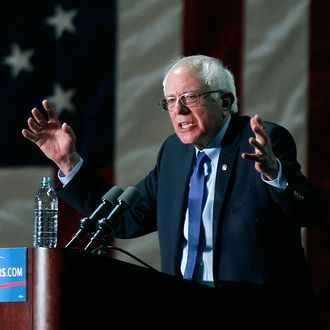
After a less-than-super Tuesday, Bernie Sanders’s campaign faces a virtually insurmountable deficit in pledged delegates. With her blowout wins in Florida, North Carolina, and Ohio — and narrow victories in Illinois and Missouri — Clinton could lose the vast majority of remaining states and still earn the nomination. But to keep his political revolution churning as the primary shifts to friendlier pastures, Sanders needs to offer his supporters and donors some vision for how a come-from-behind win could come about.
The best one his campaign has come up with is … not great. According to Politico, Sanders’s plan is to get as close in the race for pledged delegates as possible, and then convince the very Establishment that he’s been disparaging for months to override the consensus of voters and throw the primary to a socialist insurgent.
“The arguments that we’re going to muster are going to be based on a series of facts,” Sanders campaign manager Tad Devine told Politico (emphasis ours). “People will look at different measures: How many votes did you get? How many delegates did you win? How many states did you win? But it’s really about momentum.”
The Sanders campaign is not explicitly calling for superdelegates to negate the democratic will — a notion that it recently condemned. But Devine’s emphasis on momentum implies as much. Sanders has little chance of overcoming the delegate advantage that Clinton wracked up in her southern landslides, but he has a decent shot of winning more states than the front-runner between now and the nomination. Which is why, in Devine’s view, “it’s really about momentum.”
It seems doubtful that Sanders has genuine faith in this cockamamie scheme. The superdelegate system pretty much exists to prevent the nomination of someone like Sanders, a socialist insurgent looking to chase the money lenders from the Democratic temple.
Most likely, his campaign is merely looking for any narrative that can keep its supporters mobilized from here to the convention. Even if Sanders isn’t going to be the Democratic nominee, his political revolution has plenty to gain in collecting as many delegates as it possibly can. Sanders’s surprising strength in the race thus far — and, in particular, his dominance among millennial voters — has led many pundits to predict that his social-democratic vision represents the future of the Democratic Party. The next month of primary contests looks like the most Sanders-friendly stretch of the race thus far. According to FiveThirtyEight’s demographic projections, Sanders is favored to win seven of the next eight primaries or caucuses. If Sanders wishes to demonstrate the broad appeal of his ideology, there’s little sense in dropping out with those potential victories still on the table. Thanks to his campaign’s incredible fund-raising apparatus, the democratic socialist should have plenty of cash to keep fighting, even if donations slow down in the wake of last night’s losses.
Sanders is not going to convince the Democratic Party’s elders to back the candidate with fewer pledged delegates and Establishment connections. But suggesting that such a thing might be possible will allow him to send a louder message to the party’s younger politicians and operatives: Economic populism works. Clinton, for one, seems to have heard that message quite clearly.






























